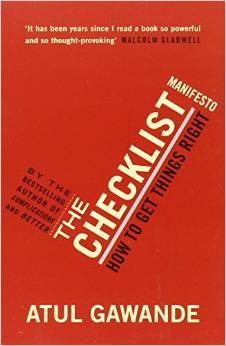B2B Sales: Why you must systematically target these 3 avoidable errors
March 18, 2015

Sales people and sales leaders have been regularly urged over the years to adopt “best practices” as a way of improving sales performance. I raise my hand and acknowledge that I have been one of the many lobbyists for this approach. But lately I’ve been wondering if maybe I’ve been looking through the wrong end of the telescope.
I’ll acknowledge a debt of gratitude to the author Atul Gawande and his book “the Checklist Manifesto” for causing me to adopt a fresh perspective. Because as I look around at the patchy success of many initiatives that have sought to drive the adoption of best practices, I’ve come to believe that we would be way more effective if we started by simply eliminating the obvious avoidable errors…
 Gawande writes from the perspective of a Harvard Medical School professor. He knows all about life-or-death responsibilities. He provides compelling evidence for the power of systems as applied to medicine, but the consequences of his thinking stretch far beyond the confines of healthcare.
Gawande writes from the perspective of a Harvard Medical School professor. He knows all about life-or-death responsibilities. He provides compelling evidence for the power of systems as applied to medicine, but the consequences of his thinking stretch far beyond the confines of healthcare.
Systematic checklists and peer reviews are an accepted necessity in aviation and a number of related disciplines - including medicine. They might be seen to be promoting best practice, but their real value lies in helping to ensure that the predictable, avoidable errors than even the most experienced practitioners might occasionally be prone to are systematically eliminated.
In a recent article, I suggested that B2B sales processes need to support artisans rather than creating automatons. I believe that one of the key things a successful sales process needs to do is to help eliminate avoidable errors. And defined processes are not merely for inexperienced, greenhorn sales people - even your longest serving sales person can benefit.
From a sales perspective, I believe that we can identify at least three sources of avoidable errors:
1: Errors of ignorance
Errors of ignorance are the errors that cause us to make faulty choices because we were ignorant of an important fact or facts that would have caused us to act differently if we had known about them. These are often caused by failing to do our research properly, or failing to ask the right questions.
Inexperienced sales people often suffer from these types of errors, but even experienced sales people can miss asking what in retrospect appears to be an obvious question or questions. The key to eliminating them is to identify the most common types of errors of ignorance, and to embed them in simple checklists that every sales person is expected to thoughtfully review as part of the defined sales process.
2: Errors of assumption
Errors of assumption lead to faulty decisions that are based on imperfect or untested information about which we have made unjustifiable assumptions. These errors typically include assuming that people or organisations will behave in the future as they have in the past, assuming that similar people or organisations will behave in similar ways, or assuming that a previously well-understood situation hasn’t changed in the meantime.
Even highly experienced sales people can be prone to these errors of assumption. If a fact is material to your sales strategy, it’s worth validating it - and regularly re-checking it to make sure that the situation hasn’t changed in the meantime.
Simple checklists that highlight the most critical assumptions upon which a particular sales strategy is based and which force sales people to positively revalidate them at regular intervals can help to mitigate the worst of these errors.
3: Errors of ineptitude
Errors of ineptitude are amongst the most frustrating errors, but all too common and yet easily avoidable. They stem from failing to effectively apply information, knowledge or experience that is already in our possession. This can happen at an individual level, but also - and far more wastefully - at an organisational level.
Someone, somewhere, elsewhere within the organisation has the vital information, knowledge or experience that the individual sales person is missing - but the organisation has failed to establish effective mechanisms to share those insights. This is where the failure to implement an effective form of collective learning can really damage an organisation.
At the opportunity or customer level, this is a powerful argument for implementing accessible information-sharing within your CRM platform. But in terms of more generic knowledge, it is an equally powerful argument for implementing a systematic sales enablement programme that includes key messages and materials, and proven responses to tough-to-answer questions.
In conclusion
It’s all too easy to suffer from errors of ignorance, assumption or ineptitude. There’s almost certainly a lot more of it going on within your organisation that might be immediately visible to you. Human nature being what it is, it’s probably impossible to completely eliminate these errors. But can be no doubt that a systematic, thoughtful approach - along the lines I have suggested - will help to radically reduce both their occurrence and their impact.
Please share your thoughts on the subject…



Comments